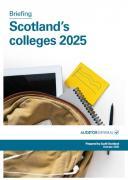UHI Contributes £191m To Scottish Economy
17th March 2011
The University of the Highlands and Islands (UHI) contributes £191m every year to the Scottish economy and supports 3,300 full time jobs, according to a new independent economic impact assessment.
Scotland's newest university also helps to sustain a further contribution of £202m every year and 2,700 jobs through the further education provision of the 13 academic partners and research institutions in the partnership.
The report 'Economic impact of the University of the Highlands and Islands and its academic partners' showed that for every £1 invested in UHI, the university put back nearly £4 into the Scottish economy.
Welcoming the findings, UHI principal and vice-chancellor James Fraser said: "This research was commissioned to measure the impact the University of the Highlands and Islands is having on the economies of Scotland, our operating area in the Highlands and Islands and Perthshire and at a local partner level. It shows that investment in UHI from the public purse has a demonstrable benefit and, in these uncertain economic times, it is right to analyse that benefit and let people know the value UHI brings to their communities.
"It reaffirms our belief that there is a tangible economic difference to be made by UHI delivering higher education in partnership with our constituent colleges and research centres, many of whom who also deliver further education in their respective communities."
However, Mr Fraser has warned that UHI will need a greater share of public funding if it is to achieve its objectives. In the run-up to the Holyrood election in May, UHI is lobbying the political parties to press its case.
He explained: "A new university awakens high levels of expectation in its community. UHI is no exception. We have to generate the academic and financial strength to grow our activities in order to satisfy the demand for education, training, learning and research.
"There are enormous expectations on UHI as a new university to recruit more young people in our region and to attract more students to our region from the rest of Scotland and the UK. We can only satisfy these expectations by attracting a greater share of public funding than we have historically received.
"We are in the ironic position of being able to accept more students from outside the UK, because we charge them full cost fees, but not able to grow the number of students from the UK and Europe, because of government funding constraints.
"Scotland has created a new university; Scotland must ensure that it progresses to maturity by allocating exceptional funding in the early years."
The study, which looks at data supplied from 2009/10, examined:
Direct impacts of the university, including staff employed and their spending in their home area, associated services and resulting jobs
Student impact including their spend and jobs through part-time work during study
Additional economic activity through attracting and retaining graduates
Increased productivity from higher qualification levels
Research commercialisation and the liaison between education and business
Tourism
Capital projects eg new building works
It also details these impacts with regard to the UHI academic partners and research institutions in their particular areas.
The report has been compiled by BiGGAR Economics which recently completed similar research for Universities Scotland.
UHI web site - www.uhi.ac.uk
In Caithness the North Highland College is part of the UHI
Web site - www.nhcscotland.com
Related Businesses
Related Articles
Have your say in Thurso's future £100million investment by attending public consultation events
Thurso is to benefit from £100m investment in education and community facilities and are rolling out the first phase of public consultations on 9 and 10 December 2025. The Highland Council is inviting people that live, work, or study in Thurso, to come along to the public consultation events to have their say; this is an opportunity to help shape the future of Thurso, to gather views and ideas.Workforce North event spotlights Highland economy
EMPLOYERS and educators from across the Highlands have gathered to hear how a new initiative is aiming to transform the region's economy. Workforce North - A Call to Action brought together business leaders and teachers from primary and secondary schools from across the Highland Council area with a wide range of partners geared towards education, learning and skills development at Strathpeffer Pavillion.
Tartan challenge for UHI students offers £1,500 prize
Students from across the University of the Highlands and Islands (UHI) partnership have been challenged to design a tartan and be in with a chance of winning a £1,500 cash prize. Highlands and Islands Enterprise (HIE) has launched THE COMPETITION to mark 60 years since the regional development agency (then named Highlands and Islands Development Board) was established in November 1965.
University (UHI) Staff Strike in Dispute Over Job Cuts Today - 10 Redundancy Notices already Handed Out
Staff at University of the Highlands and Islands (UHI) have commenced a series of strike actions beginning 30 October 2025, in protest at proposed job cuts and the use of compulsory redundancies. The walk-out is set for four days this month today 30 October and further dates on 5, 17 and 18 November.Scotland's Colleges Feeling Impact Of Funding Cuts
Scotland's colleges face changing how they operate due to ongoing financial pressures. The sector has experienced a 20 per cent real terms cut in funding over the last five years.
Financial Health Report - Scottish Universities and Colleges
Scottish universities and colleges are navigating a sustained decline in public funding, significant cost pressures, and rising operating deficits. Universities saw their collective underlying surplus tumble by 92% in 2023-24, while colleges face a real-terms funding cut of 17% since 2021-22.
Scottish Colleges' Financial Challenges Increase
Scotland's colleges need more clarity from ministers on what parts of their role to prioritise, as the sector's financial challenges mount. Scottish Government funding for colleges reduced by £32.7 million in cash terms in 2024/25.
UHI and SQA announce new pathways for learners with articulation agreement 
The University of the Highlands and Islands (UHI) and Scottish Qualifications Authority (SQA) have announced the signing of a new articulation agreement. Yjis will allow learners who have completed SQA's Higher National Certificates and Diplomas to seamlessly progress onto UHI degree programmes at advanced levels increasing accessibility to higher education and streamlining progression pathways.
Highland And Islands MSP Rhoda Grant Refused A Meeting With Ministers As College Budgets In Scotland To Be Slashed
Highland and Islands MSP Rhoda Grant has hit out at a lack of engagement by the Scottish Government over planned cuts to UHI. Despite consistent requests for engagement and discussion with Scottish Ministers, there has been no commitment on holding talks.Research Partnership Established Between UHI Scientists And Bangalore North University In India To Support Groundbreaking Water Recycling Project
University of the Highlands and Islands (UHI) researchers from the Environmental Research Institute (ERI) based at UHI North, West and Hebrides Thurso campus, and the Centre for Living Sustainability based at UHI Inverness, recently returned from a visit to Bangalore North University in India where they established an environmental and social sciences research partnership. Dr.
